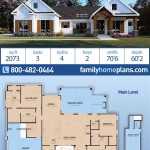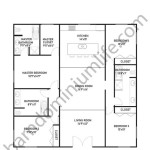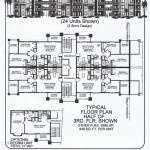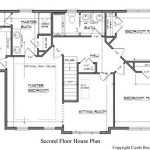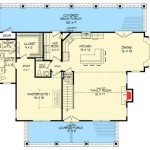Modern Farmhouse Plans With Basement: Expanding Space and Style
Modern farmhouse architecture blends the rustic charm of traditional farmhouses with contemporary design elements. This style emphasizes clean lines, natural materials, and functional layouts, creating homes that are both aesthetically pleasing and practical. When combined with a basement, modern farmhouse plans offer a significant expansion of living space, catering to a variety of lifestyle needs. Basements can be transformed into recreation rooms, home offices, guest suites, or storage areas, adding considerable value and versatility to the home.
The incorporation of a basement into a modern farmhouse design requires careful consideration of site conditions, budget, and intended use. Proper planning ensures that the basement is not only structurally sound but also seamlessly integrated into the overall aesthetic of the home. This article explores key aspects of modern farmhouse plans with basements, including design considerations, functionality, and potential benefits.
Key Considerations for Designing a Modern Farmhouse with a Basement
Designing a modern farmhouse with a basement involves several critical considerations to ensure both structural integrity and functional design. These include site assessment, structural design, material selection, and compliance with local building codes.
Site Assessment and Preparation
The first step in planning a modern farmhouse with a basement is a thorough site assessment. This involves evaluating soil conditions, water table levels, and the slope of the land. Soil testing determines the load-bearing capacity of the soil and identifies any potential issues such as expansive clay or unstable ground. High water tables can lead to basement flooding and require the installation of drainage systems or waterproofing measures. The slope of the land can be utilized to create a walk-out basement, offering natural light and direct access to the outdoors.
Proper site preparation is essential for a stable foundation. This includes clearing the land, grading the soil, and ensuring adequate drainage. Poor site preparation can lead to foundation problems in the future, such as cracks, leaks, and structural instability. Consulting with a geotechnical engineer during the site assessment phase is highly recommended to address any potential challenges and ensure a solid foundation for the home.
Structural Design and Foundation
The structural design of the basement foundation is crucial for the overall stability of the modern farmhouse. The foundation must be able to withstand the weight of the house, soil pressure, and hydrostatic pressure from groundwater. Common foundation types for basements include poured concrete walls, concrete block walls, and insulated concrete forms (ICF). Poured concrete walls are durable and resistant to water penetration, making them a popular choice. Concrete block walls are more cost-effective but may require additional reinforcement and waterproofing. ICFs provide insulation during construction and enhance the energy efficiency of the basement.
The foundation design must also consider the depth of the basement and the height of the water table. Building codes typically require foundations to be below the frost line to prevent heaving and cracking due to freezing and thawing cycles. Adequate waterproofing measures, such as exterior drainage systems and waterproof membranes, are essential to prevent water damage. Structural engineers play a vital role in designing the foundation to meet these requirements and ensure the long-term stability of the home.
Material Selection and Aesthetics
The choice of materials for the basement impacts both its functionality and aesthetics. For the foundation walls, concrete or concrete blocks are commonly used for their strength and durability. Interior finishes can be customized to match the modern farmhouse style of the rest of the home. Options include drywall, wood paneling, exposed brick, and painted concrete.
Flooring materials should be durable, water-resistant, and comfortable. Concrete floors can be polished and stained to create a modern industrial look. Tile and luxury vinyl plank are other popular choices for their durability and ease of maintenance. Carpeting can add warmth and comfort, especially in recreation rooms or home theaters, but it is important to choose a moisture-resistant type to prevent mold and mildew growth.
Incorporating natural light into the basement is essential for creating a comfortable and inviting space. Windows, window wells, and walk-out basements can all be used to bring natural light into the basement. Light wells should be properly drained to prevent water accumulation. Artificial lighting should also be carefully planned to provide adequate illumination. Recessed lighting, pendant lights, and sconces can all be used to create a warm and inviting atmosphere. The use of light colors and reflective surfaces can further enhance the brightness of the basement.
Functional Uses of a Basement in a Modern Farmhouse
The basement in a modern farmhouse can serve a variety of functional purposes, adding significant value and versatility to the home. Common uses include recreation rooms, home offices, guest suites, storage areas, and home theaters. The specific use of the basement will influence the design and layout, including the placement of windows, doors, and utilities.
Recreation Room and Entertainment Area
A recreation room is a popular choice for a basement, providing a dedicated space for relaxation and entertainment. This can include a living room area, a game room, or a combination of both. The recreation room can be customized to suit the homeowner's interests and lifestyle. For example, it can include a pool table, a ping pong table, a home theater system, or a wet bar.
Proper soundproofing is important to minimize noise transfer to the upper levels of the house. This can be achieved through the use of sound-dampening materials in the walls, ceilings, and floors. Adequate ventilation and climate control are also essential for creating a comfortable environment. A mini-split system or a zoned HVAC system can be used to provide separate heating and cooling for the basement.
Home Office and Workspace
With the increasing prevalence of remote work, a home office in the basement can provide a dedicated and quiet workspace. The home office should be designed to be functional and comfortable, with adequate lighting, ventilation, and storage. A separate entrance can be added to the basement to allow clients to visit without entering the main living area of the house.
The home office should be wired for internet access and electrical outlets to accommodate computers, printers, and other electronic devices. Ergonomic furniture, such as an adjustable desk and chair, can help to prevent discomfort and strain. Natural light is important for creating a pleasant work environment, so consider adding windows or a light well to the home office.
Guest Suite and In-Law Apartment
A basement can be transformed into a guest suite or in-law apartment, providing a private and comfortable space for visitors or family members. The guest suite should include a bedroom, a bathroom, and a living area. A small kitchenette can be added for convenience.
Egress windows are required in all bedrooms to provide a safe escape route in case of a fire. The guest suite should be designed to be accessible for people with disabilities, with features such as wide doorways, grab bars in the bathroom, and a ramp or elevator for access. Separate utilities, such as a water heater and electrical panel, can be installed to provide greater control and independence for the occupants of the guest suite.
Benefits of a Basement in a Modern Farmhouse
Adding a basement to a modern farmhouse offers several benefits, including increased living space, enhanced property value, improved energy efficiency, and storm shelter capabilities. These benefits can significantly enhance the functionality and value of the home, making it a worthwhile investment.
Increased Living Space and Home Value
The primary benefit of adding a basement to a modern farmhouse is the significant increase in living space. This additional space can be used for a variety of purposes, such as recreation rooms, home offices, guest suites, or storage areas. The increased living space can also enhance the resale value of the home, making it a sound investment.
The value added by a basement depends on several factors, including the size of the basement, the finishes, and the location of the home. A finished basement typically adds more value than an unfinished basement. The basement can also be used to create a rental unit, generating additional income for the homeowner.
Improved Energy Efficiency and Climate Control
A basement can improve the energy efficiency of a modern farmhouse by providing additional insulation to the home. The earth surrounding the basement walls helps to regulate the temperature, keeping the basement cooler in the summer and warmer in the winter. This can reduce energy consumption and lower utility bills.
Insulating the basement walls and floors can further enhance energy efficiency. Spray foam insulation, rigid foam insulation, and fiberglass insulation are all common choices. A dehumidifier can be used to control humidity levels in the basement, preventing mold and mildew growth. Proper ventilation is also important for maintaining air quality and preventing moisture buildup.
Storm Shelter and Safety Features
A basement can serve as a storm shelter in areas prone to severe weather, such as tornadoes or hurricanes. The basement provides a safe and secure space to take refuge during a storm. Reinforcing the foundation walls and adding a steel door can further enhance the safety of the storm shelter.
Emergency supplies, such as food, water, and a first-aid kit, should be stored in the basement in case of a prolonged power outage or other emergency. A battery-powered radio can be used to monitor weather conditions and emergency broadcasts. The basement should be equipped with smoke detectors and carbon monoxide detectors to alert occupants in case of a fire or carbon monoxide leak.

Exclusive Modern Farmhouse Plan With Optional Walk Out Basement 910073whd Architectural Designs House Plans
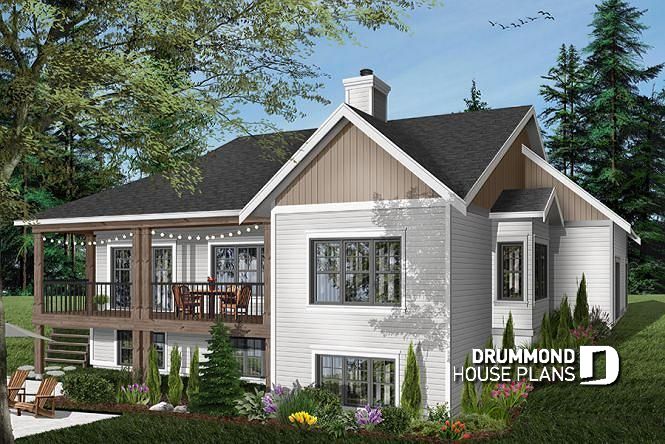
Modern Farmhouse Plan W Walkout Basement Drummond House Plans

Modern Farmhouse Plans With Basements Houseplans Blog Com

Modern Farmhouse Floor Plan 3 Bedrms 5 Baths 1892 Sq Ft 205 1231

Farmhouse Plans With Basement Houseplans Com

Aspen Hill House Plan Modern Farmhouse Craftsman

Plan 23771jd Striking 4 Bed Farmhouse With Walk Out Basement House Plans Modern

Affordable Farm House Style Plan 8821

Plan 64468sc Modern Farmhouse With Optional Finished Lower Level Plans Basement House Lake

Cranberry Gardens House Plan Archival Designs

